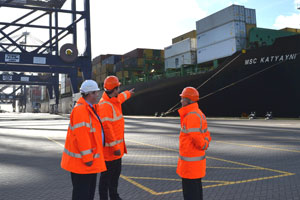
From left: Stephen Abraham, Chief Operating Officer of the Port of Felixstowe with Ali Rais Shaghaghi and Dr Abdel Salhi from Essex.
Mathematicians from the University of Essex have joined forces with the Port of Felixstowe to develop new ways of improving the complex process of handling millions of containers every year.
As the busiest container port in the UK, handling 42% of all the UK’s container traffic, Felixstowe relies on complex planning and scheduling to cope with the demands of handling 3.7 million containers every year.
Now, via an innovative two-year Knowledge Transfer Partnership (KTP), maths experts at Essex are working with the Port to develop new improved solutions to some of the very complex planning and scheduling problems faced with handling goods worth an estimated £60 billion every year.
The KTP follows a successful collaborative project with the University involving maths student Jenny Adamson a couple of years ago, which looked into using mathematical methods to develop new improved solutions to some of the very complex operations problems the Port faced.
KTPs support UK businesses wanting to improve their competitiveness, productivity and performance by accessing the knowledge and expertise available within UK universities and colleges.
The new collaboration, led by Head of Mathematical Sciences at Essex, Dr Abdel Salhi and PhD student Ali Rais Shaghaghi, involves using mathematical optimisation technology to come up with new methods to solve scheduling problems and, in particular, scheduling the labour force deployed daily at the Port.
"It is a challenging project because the problems are very complex from both the mathematical and the practical points of view," explained Dr Salhi. "Like any business, time is money and the Port needs to ensure it is making the best use of its resources. It is all about making efficiencies in everything from labour force requirements to scheduling in maintenance at the best time for the Port. Berths and the giant cranes are very expensive facilities that must be used as near their maximum potential as possible and not left idle.
“We will first look at what is available for use in terms of mathematical optimisation tools. But, we are prepared to come up with new approaches and develop new tools to handle the problems, if need be. The University of Essex has a lot of expertise in developing optimisation tools, both algorithms and software."
Stephen Abraham, Chief Operating Officer at the Port of Felixstowe, said: “Few people appreciate the sophistication of the processes, systems and equipment that we deploy at the port. We have a wide range of highly-qualified and skilled technical specialists working with the latest technologies; without these people we could not deliver the service our customers expect.
“We were encouraged by the level of interest from the University of Essex to work with us in developing innovative solutions, using some of the brightest academic minds. This work has led to further exploration of how we could engage with the University which resulted in the agreement to enter into a two-year Knowledge Transfer Partnership (KTP) in the area of labour optimisation and planning.”
The Port of Felixstowe operates some highly complex logistic planning and scheduling processes across a large scale 24/7 operation, involving 34 giant ship-to-shore gantry cranes serving 3,000 ships which call every year – including the world's largest container ships which are 400m long and carry 18,000 containers.
Some of the problems the mathematicians are hoping to solve could have universal applications which could easily translate to other businesses.
Ends
Note to editors
For more information please contact the University of Essex Communications Office on 01206 872400 or email: comms@essex.ac.uk.
About KTP
Knowledge Transfer Partnerships are a government-funded technology transfer initiative that supports partnerships between business and universities, placing graduates on challenging, high profile projects. Further information of KTPs with the University of Essex please email: partners@essex.ac.uk.